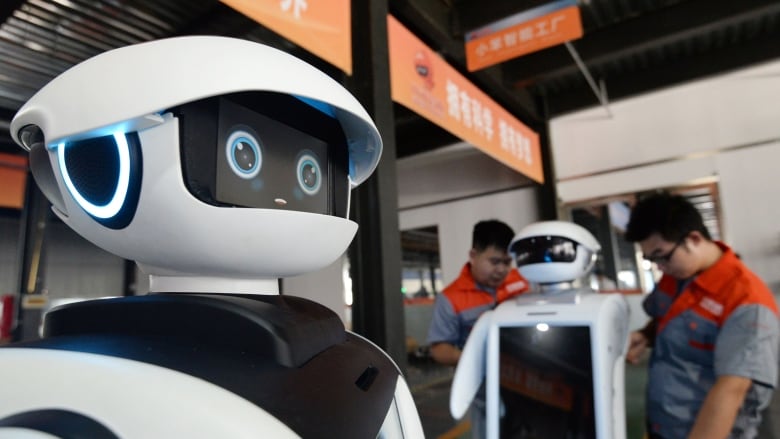AI research in health care could lead to being diagnosed by a vending machine — with some caveats
Robots still can't perform every aspect when it comes to our health: U of R professor

Imagine getting a medical diagnosis from a vending machine or a humanoid doctor. That type of artificial intelligence in health care could be just around the corner.
David Gerhard, head of the Department of Computer Science at the University of Regina, said robotics and healthcare artificial intelligence can already do some basic medical tasks like assessing and diagnosing some patient's symptoms or using AI to develop medical devices.
The pandemic is pushing advancements in healthcare technology in areas like developing robots to deliver care in the home instead of having to go to the hospital, or AI that interacts with people who are in isolation.
That is a big advantage for people living in remote areas like northern Saskatchewan.
"But we always have to be careful to temper that with an expectation of what AI and robotics can't do," Gerhard told The Morning Edition's Peter Mills.
"If somebody in the far north can check into a computer system and say, 'I've got this, this, this and this, then the system can say, 'OK, well, that's clearly this or we need to ask you more questions or or you need to talk to a doctor or whatever.'" Gerhard said.
"The problem is, we sort of already have that with the Internet. And we know that the kind of quality of answers that we get when you sort of try to diagnose yourself on the Internet is not great."

On their podcast Sicker Than Your Average Show, Josh Britton, a medical student at the University of Saskatchewan, and Preet Gandhi, who has a masters in Global Health from McMaster University, envision a future where you can get medical advice from a vending machine.
"The vending machine is sort of talking to you and it's in a voice that sounds friendly and it says, 'Hey, what seems to be the problem?' And you as a patient, you explain, 'Oh, I've been having this going on. It's been going on for this many days.'" Britton said.
The machine doctor can then do some tests.
"While you're standing there, it performs an X-ray, it performs an ultrasound, you know, some robotic arm on this X-ray machine waves beside your body and performs that scan," Britton said.
It then makes a diagnosis and decides if you need to go into the hospital or prescribe medication.
"And just like a vending machine spits out that medication, directions and all, and sends you on your way."
Gerhard said the challenge with AI is developing a personal relationships with the patient.
Gerhard said it's not just about prescribing medication. There are social psychological nuances that AI isn't yet able to decipher.
"We imagine ... in a far future world, maybe we'll have robots that can do these kinds of things. But today there's a lot of this kind of stuff that needs to be maintained via human relationships," Gerhard said.

Another form of artificial intelligence that could help deliver health care is humanoid-type robots like what we see in sci-fi flicks.
Gerhard said there are many companies trying to make these robots as human as possible, but it is very difficult to get it just right.
"The theory is, you can have a humanoid robot that has the potential to have a better connection with humans than, you know, a walking, talking trash can," he said.
"The problem is, we just can't quite get it right. And there's this phenomena in robotics and artificial intelligence and computer graphics called the 'uncanny valley,' where if you're trying to make a humanoid and you don't quite get it right, it's worse than getting it wrong."
Gerhard said if these humanoids aren't exactly right, they end up just being creepy and we end up having a negative emotional response.
"What we find is that humans don't trust the decisions that are made by artificial intelligence in the same way that they trust the decisions made by humans, even if the artificial intelligence decision is demonstrably better," he said.
"And so it's not just a matter of how to allow robotics or machines to make some of these decisions for us quicker and better, but also how to make sure that we as humans trust these kind of decision making processes and trust the machines that we build to do the work for us."
With files from The Morning Edition